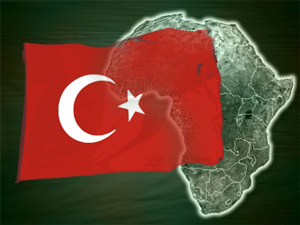Authors: Ibrahim Bachir Abdoulaye, Zainul Abideen Jibril
Affiliation: Bayreuth International Graduate School of African Studies (Bayreuth, Germany), Adamawa State University (Mubi, Nigeria)
Organization/Publisher: SETA
Date/Place: October 2021/ Ankara, Turkey
Type of Literature: Article
Number of Pages: 4
Link: https://www.setav.org/en/perspective-turkeys-multidimensional-strategy-towards-africa/
Keywords: Turkey, Africa, Cooperation, Diplomacy, Soft Power
Brief:
Ibrahim Bachir Abdoulaye and Zainul Abideen Jibril discuss the Turkish multi-dimensional strategy towards Africa. They first outline the Turkish-African relations and Turkey’s policy towards Africa, then analyze Erdogan’s visit to Angola, Toga, and Nigeria. Turkey’s policy towards Africa has first been defined in the ‘Africa Action Plan ’in 1998 which aimed at developing economic relations with Africa to open new markets, yet this plan was not put into action until 2002 when the AKP came to power. African countries have welcomed the Turkish partnership due to its clean history from colonialism in the continent, and Turkey has sought to maintain its position in Africa through enhancing economic and social developments based on bilateral relations. While African countries consider their relations with Turkey as essential to the diversification of their international relations and opening the way for more investment opportunities and economic development, the Western countries consider it as an offence by Turkey to achieve a neo-Ottoman paradigm. The African continent is advantageous to Turkey due to its geographical proximity, its historical and religious ties, and economic opportunities. Accordingly, Turkey has embraced a “multidimensional strategy” which encompasses state and non-state actors that collaborate on diplomacy, economy, and politics. This has included almost 43 diplomatic missions coordinated by TİKA (The Turkish Cooperation and Coordination Agency) along with many non-state actors such as Yunus Emre cultural centers, the Maarif Foundation, and many other NGOs that provided humanitarian aid. The authors shed light on Erdogan’s recent visit to Angola, Toga, and Nigeria. They underlined that the choice of these countries is based on their critical strategic position to the Turkish interests in the continent. Security issues, fighting terrorism such as FETO, trade, and humanitarian aid have been on the top of the cooperation plan priorities. To sum up, Turkey embraces ‘bilateral, regional, continental, and global dimensions ’while arranging multiple cooperation aspects including politics, economy, culture, and humanitarian aspects. The last visit of Erdogan to Africa aimed to strengthen these relations and underline the Western injustices toward Africa.
By: Yomna Süleyman, CIGA Research Assistant




